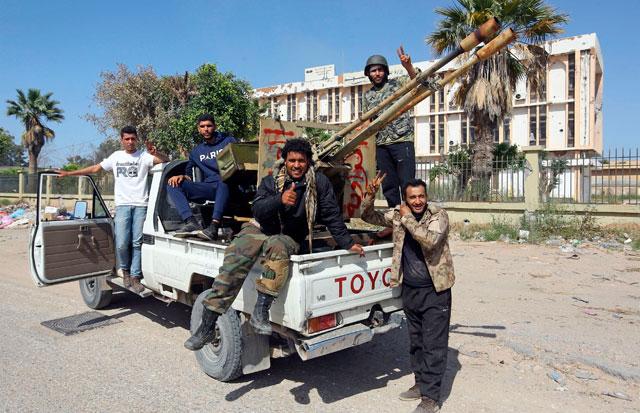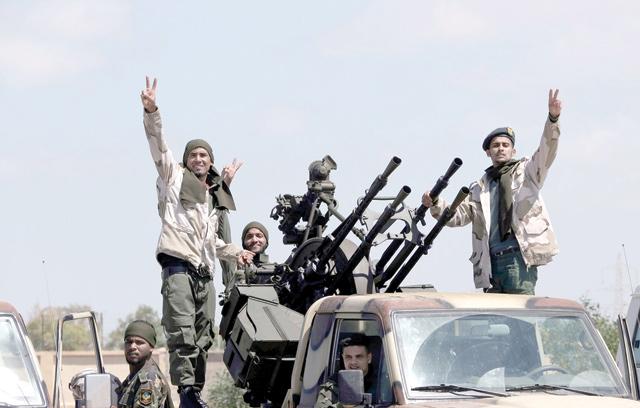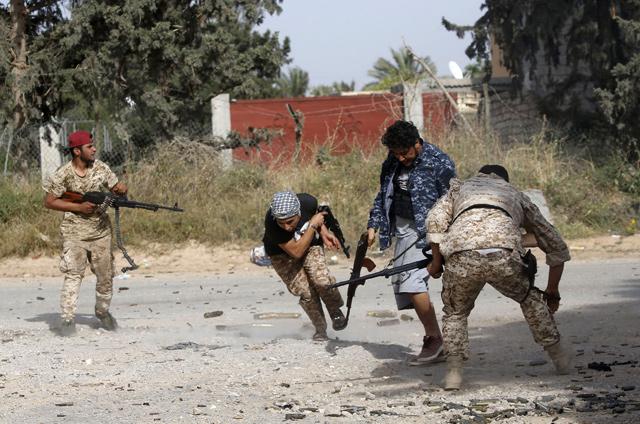You are here
UN's Libya envoy warns Tripoli fight could spark 'conflagration'
By AFP - Apr 18,2019 - Last updated at Apr 18,2019

Forces loyal to Libya's Government of National Accord gesture on Thursday, after taking control of the area of Al Aziziyah, located some 40 kilometres south of the Libyan capital Tripoli, following fierce clashes with forces loyal to strongman Khalifa Haftar (AFP photo)
TRIPOLI — The UN's Libya envoy warned Thursday of "a widening conflagration" in the North African country, saying international divisions had encouraged strongman Khalifa Haftar to launch his assault on Tripoli.
Despite days of heaving fighting, Ghassan Salame told AFP there was a stalemate south of the capital between Haftar's self-styled Libyan National Army (LNA) and the internationally recognised government.
"After the very first successes of the LNA two weeks ago, we are witnessing a military deadlock," he said.
Fighting broke out on April 4 when Haftar and his LNA, based in the country's east, launched an offensive to take Tripoli, the western seat of the UN-recognised Government of National Accord (GNA).
The GNA on Thursday issued an arrest warrant against Haftar for allegedly ordering deadly air strikes against civilian areas, its press office said.
A spokesman for the GNA said it was seeking an international arrest warrant against Haftar for "war crimes", as two UN experts were expected in Tripoli later Thursday to investigate the origin of rocket fire that killed six people the previous day.
Salame told AFP that "international divisions" prior to the assault on Tripoli had emboldened Haftar, who is backed by Russia and seen by his allies Egypt and the United Arab Emirates as a bulwark against Islamists.
"There are countries that have invested in Mr Haftar as a champion of the fight against terrorism," Salame said, without naming any countries.
"They will not drop him now even if they do not agree with his attack on Tripoli."
Haftar's offensive forced the UN to postpone a national conference that was to draw up a roadmap to elections in a bid to turn the page on years of turmoil since the 2011 ouster of dictator Muammar Qadhafi.
“We worked for a whole year to prepare something that has no precedent,” he said, saying the plan had been to “bring the country out of chaos”.
Instead, the political process was on hold and “these efforts are going up in smoke a little like the attic of Notre Dame Cathedral in Paris”, he said.
‘Heaviest fighting’
The renewed fighting has killed at least 205 people and left more than 900 wounded, the World Health Organisation said Thursday, while more than 25,000 have been displaced, according to the International Organisation for Migration.
Fighting continued Thursday on several fronts south of Tripoli, AFP journalists on the ground and security sources said.
With both sides dug in, Tripoli this week witnessed its heaviest fighting since Haftar launched his offensive, including what the UN described as “indiscriminate rocket fire on a high-density neighbourhood” of Tripoli.
World powers have long been divided on how to stabilise Libya, wracked by violence since Qadhafi’s fall. Haftar’s offensive has again highlighted those divisions.
“There are interests in Libya. It’s a country rich in oil,” Salame said. This “makes companies — oil companies, construction companies, etc — salivate”.
But he added that some countries had supported one camp or another for “reasons that are not necessarily economic”.
UN deeply divided
The UN Security Council has been split on how to address the latest crisis.
Negotiations this week on a draft resolution demanding a ceasefire in Tripoli have failed to yield agreement.
Germany, which holds the council presidency, called for an urgent meeting Thursday, when the council was to hear a briefing on the situation on the ground and “consult on the way forward”, according to a note seen by AFP.
Britain has put forward a draft resolution calling for an immediate ceasefire and de-escalation, but Russia objected to clauses that criticised Haftar’s offensive as a threat to Libya’s stability.
Britain put forward a slightly watered-down version on Wednesday but the three African countries on the council — Equatorial Guinea, Ivory Coast, South Africa — blocked it.
They have insisted on including a reference to an African Union statement on the need for all parties fighting in Tripoli to protect civilians, including migrants and refugees, according to documents seen by AFP.
Moscow said even the amended version was “still far away from accommodating our concerns”, according to a note from the Russian UN mission.
The revised text did not single out Haftar’s forces, but instead expressed “grave concern at military activity” near Tripoli, “including the launching of a military offensive by the LNA”.
Britain had hoped to hold a vote before Friday, but that now looks unlikely. Diplomats said the United States appeared to be dragging its feet rather than pushing for a quick adoption of the draft resolution.
Related Articles
TRIPOLI — The conflict shaking Libya escalated Sunday as forces of strongman Khalifa Haftar launched an air strike on a suburb of Tripoli an
TRIPOLI — Forces backing Libya's unity government battled to push back an offensive by strongman Khalifa Haftar on Sunday as his troops appr
TRIPOLI — Flights at the Libyan capital's sole functioning airport were suspended Thursday after deadly overnight rocket fire, a spokesman f

















